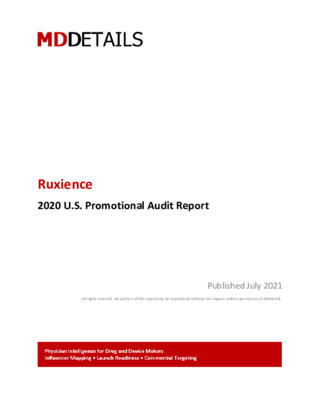Ruxience 2020 report
Ruxience 2020 U.S. PROMOTIONAL AUDIT REPORT
Published July 2021 • 22 Pages
The 5 Key Questions Addressed by this Report:
- How many physicians were reached by Ruxience through reportable promotional activity in 2020 and how does this compare to its peer set in the Follicular Lymphoma, Microscopic Polyangiitis, Non-Hodgkin’s Lymphoma, and Wegener’s Granulomatosis markets?
- What promotional mix was leveraged (e.g., sales rep detailing, physician education, and paid speaking) and what was the median spend on each type of activity?
- How does Pfizer’s depth of coverage vary within key specialties (e.g., Hematology/Oncology, Medical Oncology, and Internal Medicine) and how does this compare to its peers and the overall set of rep-accessible physicians?
- How often are physicians receiving paid meals for Ruxience throughout the year (e.g., monthly, quarterly, annually)?
- Who were the most frequent meal recipients and top paid speakers for Ruxience in 2020?
Data Sources and Methodology:
- MDDetails leverages company-reported financial transaction data disclosed through CMS Open Payments. This data set captures all transfers of value (e.g., speaking fees, consulting fees, travel, education, and meals) made on behalf of a drug or device manufacturer to a physician. Currently, over 5 years of longitudinal data is available – covering payments to more than 1,000,000 U.S. healthcare professionals.
- Over 900 paid interactions across 600 physicians made on behalf of Ruxience were carefully examined to support our analysis. In addition, interaction data from 20 peer products (e.g. Adcetris, Aliqopa, Beleodaq, Bendeka, Calquence, Copiktra, Folotyn, Gazyva, Imbruvica, Kymriah, Monjuvi, Polivy, Rituxan, Tazverik, Tecartus, Truxima, Venclexta, Xpovio, Yescarta, and Zevalin ) was leveraged to provide benchmarking and market insights.


